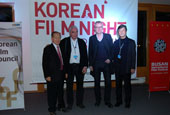Independent directors and actors often produce films just for the sake of making films, because they love films. These movies are often ignored and go unnoticed by the general public. An American film critic who has been writing about Korean films for over ten years has now created a film award for Korean indie films to help them get recognized.
Darcy Paquet, 42, recently established the Wildflower Film Awards Korea for Korean indie films and low-budget movies.
"The United States has the Independent Spirit Awards and the U.K. has the British Independent Film Awards for indie movies, but Korea doesn’t have any award ceremonies like that," said Paquet, in a recent interview with Korea.net. "I hope that more audiences will have an interest in Korean indie films through the Wildflower Film Awards Korea."
Speaking of the awards' name, Paquet said, "Wild flowers grow even on sterile land and are similar to indie films in many ways, so I named the awards after them."
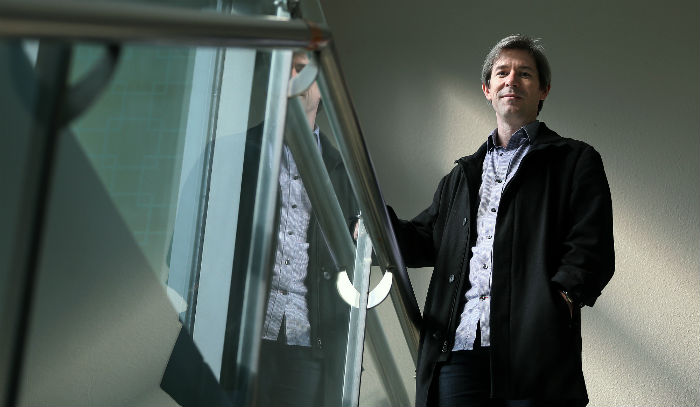
Paquet came to Korea in 1997 and taught English at Korea University. Deeply drawn to Korean films, he created the Koreanfilm.org (www.koreanfilm.org) site to introduce local movies. This website eventually led him to get involved in the Korean film industry. He started writing about Korean films on behalf of American film magazines, such as Screen International and Variety, and became a film critic. Now, he has been consulting the Udine Far East Film Festival in Italy and the San Sebastian International Film Festival in Spain and teaching about Korean film at Kyung Hee University in Seoul. He has also been translating Korean films into English and reviewing others' translations. He translated or reviewed translations for some 150 Korean films, including "The Host" by Bong Joon-ho.
Paquet has appeared in many local films as well. He took small roles in "The Taste of Money" by Im Sang-soo and "Almost Che" by Yook Sang-hyo, among others. He is also starring in the current TV series "Three Days." He said he has so many jobs that he sometimes forgets what he is doing.
On his love of Korean films, he said, "There is something very unique about the way that emotions are communicated to the audience in Korean films. This is different from Hollywood movies. They are communicated in a very direct way. That makes films a little more intense in some ways."
Paquet added that Korean directors don’t make films in the hope of making a lot of money, but because they love cinema very much.
The inaugural Wild Flower Film Awards Korea on April 1 this year are targeting only Korean films whose budget was less than KRW 1 billion and which were introduced last year. There are seven nominees for best picture and best director, including "Fatal," "The Russian Novel," and "PLUTO." There are also seven nominees for best documentary and documentary jury awards, including "Nora Noh" and "Forest Dancing."
Korea.net sat down with Darcy Paquet and talked about why he created the Wild Flower Film Awards Korea.
- What made you decide to create the Wildflower Film Awards Korea?
- Living in Korea and writing about Korean cinema, I watched many films that came out in theaters here. Beginning five years ago, many documentaries started being released in theaters, too. In fact, even though mainstream commercial films get more attention in the theaters, roughly a similar number of independent films are also released in theaters.
Much of the creativity in the Korean film industry is centered on low budget films. I am very impressed with the quality of Korean independent films. I thought that, perhaps, an awards ceremony like this would help these films get more attention. Maybe more viewers can take an interest in low-budget films, too.
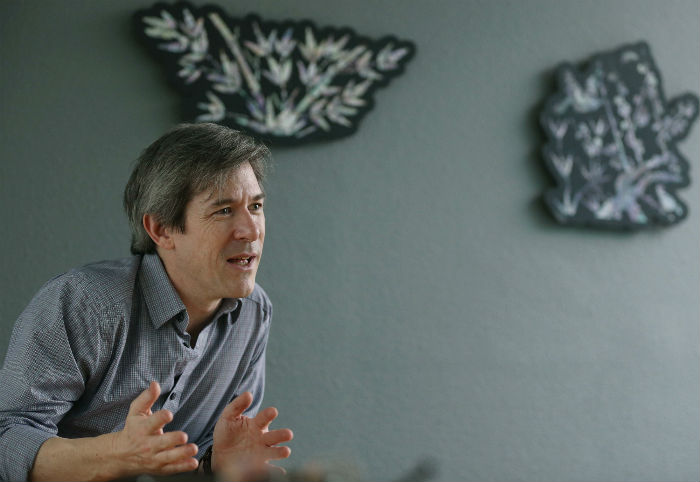
- Wasn’t it difficult to create a festival from scratch? How did it come about?
- It was very difficult. I received a lot of help from other people in the Korean film industry. I have been living in Korea for a long time. I worked as a journalist for many years. I met many producers, directors and film critics. They have all been very helpful. It was my idea and I made the plan, but other people helped me make this festival a reality. I am very grateful to them. Funding was very difficult. It was hard to take an idea and find sponsors. Next year, after we hold this ceremony, perhaps it will be easier to find sponsors.
I think it is difficult to find sponsors with only an idea. I think as times goes on, it will get a little bit easier. I started with smaller plans and thanks to help especially from Oh Dong-jin, I was able to get sponsorship from Korean production companies and other people in the film industry. In the future, I hope that we can give prize money to the winners of these awards.
- What needs to be done to grow the festival into a more recognized event?
- I think for film awards, history is very important. When we think of the Oscars or the Daejongsang, they have a very long history. I hope that this awards ceremony will also have a long successful history. As time goes by, its stature will grow. The beginning is very difficult. I think we need to try very hard to have a well-organized and fair awards ceremony. We need to establish a good system that recognizes well-made films and choose winners, so the audience can see that the films that we chose deserved to be recognized.
I think it takes time for people to learn about it. If the audience agrees with our choices, this will help our festival get established. Independent films are not very famous, so the general audience does not hear about the titles of independent films.
We have screenings as well, but we like to follow the Daejongsang. We choose films that are already released in theaters. We give prizes to best actors and actresses. We focus on the second half of the film’s lifecycle. If we think of film festivals, such as the Sundance Film Festival and the Busan International Film Festival, these are focused on introducing films for the first time to the audience. Our goal is different from that.
What we can do is help audiences not forget the films and discover films they haven’t heard about in order to give the films a chance to be recognized. Maybe it will help directors with their second films. It is different from ordinary film festivals.

- Low budget films and independent films have difficulty finding audiences, not just in Korea but also across the world. Why independent films?
- Mostly because of my experience living in Korea and watching many Korean films. When I see a film that is very interesting, the audience doesn't know the film and the film doesn't get much attention. Naturally, I wanted to help that film. Big films by Bong Joon-ho or other famous directors, those films don’t really need my help.
I am drawn to independent films because even though they are very interesting they are not getting the attention they deserve. They are underdogs in that sense.
I also appeared in independent films. I can feel that directors don’t make films in the hope of making a lot of money, but because they love cinema very much. They want to make very interesting films. They sacrifice their time and sometimes their own money to make a film. When they do that, they are very successful and we need to recognize these films.
- How did you fall in love with Korean cinema? What do you love about Korean films?
- I saw "Seopyeonje" in 1996. This is before I came to Korea. Some of my Korean friends in graduate school recommend the film. To be honest, the movie was a bit difficult for me. Pansori was difficult for me to appreciate when I heard it for the first time. Later, I came to Korea and lived several years and saw the movie again. I liked it more the second time. I understood why it was such an important movie for Korea.
The first film that impressed me was "Christmas in August." I was very impressed by the simple film, but it was very moving. I found it to have very different approaches from Hollywood film making and Japanese film making.
It was interesting for me. I was discovering Korea and at that same time I was discovering Korean cinema. Through Korean films, I could learn about Korean culture and society. I found that very interesting. The films helped me learn the Korean language, as well. Everything is connected. I think Korean films are very different from Hollywood, European and Chinese films. I am attracted to the kind of energy and the particular feeling of Korean films.
I think there is something in the way that emotions are communicated to the audience in Korean films. They are communicated in a very direct way. That makes films a little more intense in some ways. There are good points and bad points to it. Sometimes it shows emotions too directly. In general, though, this is a positive point. Sometimes, it gives Korean films, I think, something of a warm feeling, a hot feeling. You feel the emotions in Korean films differently than in films from other countries.
Part of it is cultural. Korean culture is very dynamic. In general, Koreans like to express their emotions. In some situations, they hide their emotions. They express their emotions very openly. I feel similarly with the films.
In Korea, there is a passion for and real interest in cinema. Korean directors don’t simply want to make an entertaining film. They want to make films that have a big impact on the audience. They work very hard and the way they make films is particularly exciting and impressive in some ways.
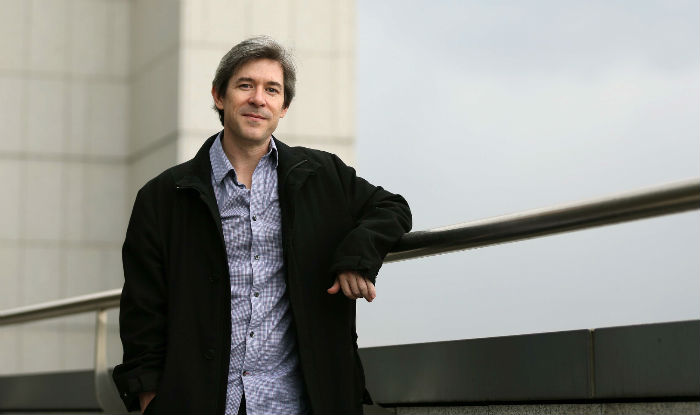
- You created the website Koreanfilm.org and then you had some health problems. Can you tell us about it?
- I was surprised about the response I received after making the website. My timing was very good. I made the website in 1999. This was a time when Korean cinema was growing very quickly. It was becoming popular at home. Internationally, people were taking an interest in Korean cinema. People outside Korea didn’t know much about Korean films. They were curious to receive more information. Through the website, I was able to give a lot of information. That helped me find a new career. It is because of that that I was asked to work as a journalist. I became a consultant for some film festivals. I ended up getting involved in a lot of different kind of work.
Concerning my wrist problems, it is becoming more common these days. People who type a lot on computers can develop some muscle problems. This was around 2006. I started having pains in my arms while I was typing. It got very bad in 2009. I had to change my work method. I found that there is a program that allows you to speak and then the compute prints the words on the screen. It is not perfect, but it works quite well. That helped me to continue as a writer. Otherwise, I would have had to give up.
It improved a little bit. I still do some time typing. Sometimes, I use dictation software. It is a mix. If I do one hundred percent typing, though, it would get worse, but now it is okay.
- What are the strengths and weaknesses of Korean films?
- Generally, the directing skills of Korean films and Korean directors are very strong. Technically, Korean films are very strong. Korean filmmakers work very hard to make quality films, well-made films. The weakness, although it is different for every film, is screenwriting. Screenwriting skills are not as well developed as directing skills.
It is mostly because it is very difficult to earn enough money as a screenwriter in the Korean film industry. Because of that, many Korean directors write their own scripts. They feel almost a responsibility to write the scripts. Sometimes that’s good, but it would also be good if there were more professional screenplay writers. There are too many directors and not many screenplay writers in Korea.
- What are your favorite Korean films and directors, and why?
- I like "Memories of Murder" by Bong Joon-ho. It is really interesting and a well-made film. I can watch it again and again. I always discover something new. I also like the fact that it looks like a police detective story in the beginning, but the ending is very different from what is expected. It is experimenting with genre.
There are low-budget independent directors I like, such as Lee Yoon-ki. One of his films is "My Dear Enemy". It has Jeon Do-yeon and Ha Jung-woo in it, but it is still a low-budget film. The story is simple, but it is a well made interesting film.
There are new directors who continue to make interesting films, too. There is Jang Kun-jae. He is one of the directors who received a nomination this year. He made a movie called "Sleepless Night."
I like both indie and many mainstream films, as well. I like director Kim Jee-woon. One of my favorite films of his is "Bitter Sweet Life" starring Lee Byung-hun. I like the mood of the film. It is a very elegant and classy film in many ways. When I teach Korean cinema classes, I show my students the beginning of the film. It is very well directed. It has an impressive opening.
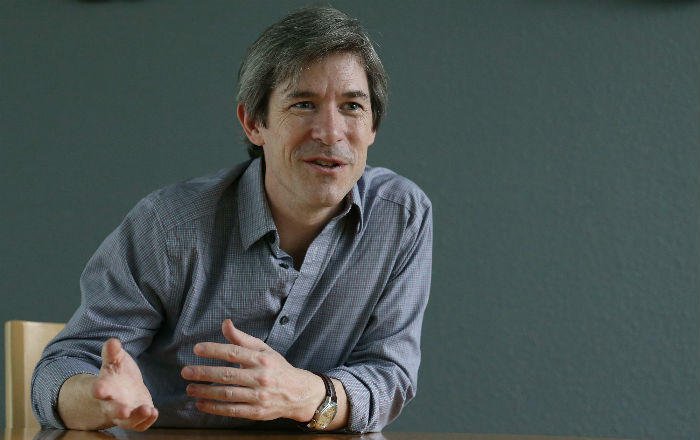
- The Korean film industry has grown quite a lot and very quickly. What would be the next step?
- Korean films are globalized. I think it is more common for Korean directors to make movies for not only the Korean audience but also for audiences around the world. They are big budget films, like Bong Joon-ho’s "Snowpiercer," which is in English. It is being screened in countries all around the world.
There are small films. There are interesting, international co-productions. Director Hong Sang-soo has been working with French actors and Japanese actors. This kind of international project is quite interesting.
- You appeared in the film "The Taste of Money." You have been a critic for a long time, but what did you think of your own acting?
- I am very critical of my own acting. Every time I watch myself on screen, I think I should quit acting. To be honest, I don’t really enjoy watching the final film because I feel too nervous watching it. I don’t have a manager or an agent. A lot of people know about me. They don’t know many foreign specialists in Korean cinema who speak Korean and go to film festivals here. So when they make a film, and they need a foreign actor, they think of me and call me up.
I really enjoy making a film, however, working together with directors, crews and actors and becoming part of the whole film-making process. For me, it was very exciting. I have been writing about films for 10 years. I finally had a chance to participate in the making of a film. It was a new perspective and made me appreciate how much work goes into the making of a film.
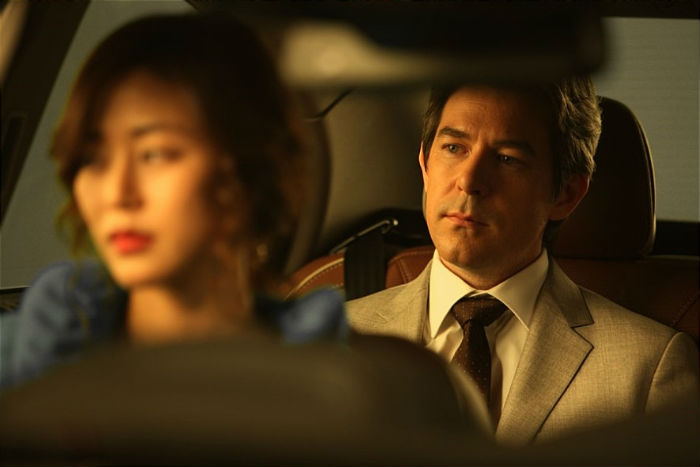
By Limb Jae-un
Korea.net Staff Writer
jun2@korea.kr

Darcy Paquet, 42, recently established the Wildflower Film Awards Korea for Korean indie films and low-budget movies.
"The United States has the Independent Spirit Awards and the U.K. has the British Independent Film Awards for indie movies, but Korea doesn’t have any award ceremonies like that," said Paquet, in a recent interview with Korea.net. "I hope that more audiences will have an interest in Korean indie films through the Wildflower Film Awards Korea."
Speaking of the awards' name, Paquet said, "Wild flowers grow even on sterile land and are similar to indie films in many ways, so I named the awards after them."

Film critic Darcy Paquet is the creator of the Wildflower Film Awards Korea. (photo: Jeon Han)
Paquet came to Korea in 1997 and taught English at Korea University. Deeply drawn to Korean films, he created the Koreanfilm.org (www.koreanfilm.org) site to introduce local movies. This website eventually led him to get involved in the Korean film industry. He started writing about Korean films on behalf of American film magazines, such as Screen International and Variety, and became a film critic. Now, he has been consulting the Udine Far East Film Festival in Italy and the San Sebastian International Film Festival in Spain and teaching about Korean film at Kyung Hee University in Seoul. He has also been translating Korean films into English and reviewing others' translations. He translated or reviewed translations for some 150 Korean films, including "The Host" by Bong Joon-ho.
Paquet has appeared in many local films as well. He took small roles in "The Taste of Money" by Im Sang-soo and "Almost Che" by Yook Sang-hyo, among others. He is also starring in the current TV series "Three Days." He said he has so many jobs that he sometimes forgets what he is doing.
On his love of Korean films, he said, "There is something very unique about the way that emotions are communicated to the audience in Korean films. This is different from Hollywood movies. They are communicated in a very direct way. That makes films a little more intense in some ways."
Paquet added that Korean directors don’t make films in the hope of making a lot of money, but because they love cinema very much.
The inaugural Wild Flower Film Awards Korea on April 1 this year are targeting only Korean films whose budget was less than KRW 1 billion and which were introduced last year. There are seven nominees for best picture and best director, including "Fatal," "The Russian Novel," and "PLUTO." There are also seven nominees for best documentary and documentary jury awards, including "Nora Noh" and "Forest Dancing."
Korea.net sat down with Darcy Paquet and talked about why he created the Wild Flower Film Awards Korea.
- What made you decide to create the Wildflower Film Awards Korea?
- Living in Korea and writing about Korean cinema, I watched many films that came out in theaters here. Beginning five years ago, many documentaries started being released in theaters, too. In fact, even though mainstream commercial films get more attention in the theaters, roughly a similar number of independent films are also released in theaters.
Much of the creativity in the Korean film industry is centered on low budget films. I am very impressed with the quality of Korean independent films. I thought that, perhaps, an awards ceremony like this would help these films get more attention. Maybe more viewers can take an interest in low-budget films, too.

Film critic Darcy Paquet said he hopes that more people will take an interest in indie films with the Wild Flower Film Awards Korea. (photo: Jeon Han)
- Wasn’t it difficult to create a festival from scratch? How did it come about?
- It was very difficult. I received a lot of help from other people in the Korean film industry. I have been living in Korea for a long time. I worked as a journalist for many years. I met many producers, directors and film critics. They have all been very helpful. It was my idea and I made the plan, but other people helped me make this festival a reality. I am very grateful to them. Funding was very difficult. It was hard to take an idea and find sponsors. Next year, after we hold this ceremony, perhaps it will be easier to find sponsors.
I think it is difficult to find sponsors with only an idea. I think as times goes on, it will get a little bit easier. I started with smaller plans and thanks to help especially from Oh Dong-jin, I was able to get sponsorship from Korean production companies and other people in the film industry. In the future, I hope that we can give prize money to the winners of these awards.
- What needs to be done to grow the festival into a more recognized event?
- I think for film awards, history is very important. When we think of the Oscars or the Daejongsang, they have a very long history. I hope that this awards ceremony will also have a long successful history. As time goes by, its stature will grow. The beginning is very difficult. I think we need to try very hard to have a well-organized and fair awards ceremony. We need to establish a good system that recognizes well-made films and choose winners, so the audience can see that the films that we chose deserved to be recognized.
I think it takes time for people to learn about it. If the audience agrees with our choices, this will help our festival get established. Independent films are not very famous, so the general audience does not hear about the titles of independent films.
We have screenings as well, but we like to follow the Daejongsang. We choose films that are already released in theaters. We give prizes to best actors and actresses. We focus on the second half of the film’s lifecycle. If we think of film festivals, such as the Sundance Film Festival and the Busan International Film Festival, these are focused on introducing films for the first time to the audience. Our goal is different from that.
What we can do is help audiences not forget the films and discover films they haven’t heard about in order to give the films a chance to be recognized. Maybe it will help directors with their second films. It is different from ordinary film festivals.

Darcy Paquet said the way emotions are communicated to the audience in Korean films is different from Hollywood movies, and that that makes the films a little more intense in some ways. (photo: Jeon Han)
- Low budget films and independent films have difficulty finding audiences, not just in Korea but also across the world. Why independent films?
- Mostly because of my experience living in Korea and watching many Korean films. When I see a film that is very interesting, the audience doesn't know the film and the film doesn't get much attention. Naturally, I wanted to help that film. Big films by Bong Joon-ho or other famous directors, those films don’t really need my help.
I am drawn to independent films because even though they are very interesting they are not getting the attention they deserve. They are underdogs in that sense.
I also appeared in independent films. I can feel that directors don’t make films in the hope of making a lot of money, but because they love cinema very much. They want to make very interesting films. They sacrifice their time and sometimes their own money to make a film. When they do that, they are very successful and we need to recognize these films.
- How did you fall in love with Korean cinema? What do you love about Korean films?
- I saw "Seopyeonje" in 1996. This is before I came to Korea. Some of my Korean friends in graduate school recommend the film. To be honest, the movie was a bit difficult for me. Pansori was difficult for me to appreciate when I heard it for the first time. Later, I came to Korea and lived several years and saw the movie again. I liked it more the second time. I understood why it was such an important movie for Korea.
The first film that impressed me was "Christmas in August." I was very impressed by the simple film, but it was very moving. I found it to have very different approaches from Hollywood film making and Japanese film making.
It was interesting for me. I was discovering Korea and at that same time I was discovering Korean cinema. Through Korean films, I could learn about Korean culture and society. I found that very interesting. The films helped me learn the Korean language, as well. Everything is connected. I think Korean films are very different from Hollywood, European and Chinese films. I am attracted to the kind of energy and the particular feeling of Korean films.
I think there is something in the way that emotions are communicated to the audience in Korean films. They are communicated in a very direct way. That makes films a little more intense in some ways. There are good points and bad points to it. Sometimes it shows emotions too directly. In general, though, this is a positive point. Sometimes, it gives Korean films, I think, something of a warm feeling, a hot feeling. You feel the emotions in Korean films differently than in films from other countries.
Part of it is cultural. Korean culture is very dynamic. In general, Koreans like to express their emotions. In some situations, they hide their emotions. They express their emotions very openly. I feel similarly with the films.
In Korea, there is a passion for and real interest in cinema. Korean directors don’t simply want to make an entertaining film. They want to make films that have a big impact on the audience. They work very hard and the way they make films is particularly exciting and impressive in some ways.

Darcy Paquet says that Korean directors want to make films that have a strong impact on the audience. (photo: Jeon Han)
- You created the website Koreanfilm.org and then you had some health problems. Can you tell us about it?
- I was surprised about the response I received after making the website. My timing was very good. I made the website in 1999. This was a time when Korean cinema was growing very quickly. It was becoming popular at home. Internationally, people were taking an interest in Korean cinema. People outside Korea didn’t know much about Korean films. They were curious to receive more information. Through the website, I was able to give a lot of information. That helped me find a new career. It is because of that that I was asked to work as a journalist. I became a consultant for some film festivals. I ended up getting involved in a lot of different kind of work.
Concerning my wrist problems, it is becoming more common these days. People who type a lot on computers can develop some muscle problems. This was around 2006. I started having pains in my arms while I was typing. It got very bad in 2009. I had to change my work method. I found that there is a program that allows you to speak and then the compute prints the words on the screen. It is not perfect, but it works quite well. That helped me to continue as a writer. Otherwise, I would have had to give up.
It improved a little bit. I still do some time typing. Sometimes, I use dictation software. It is a mix. If I do one hundred percent typing, though, it would get worse, but now it is okay.
- What are the strengths and weaknesses of Korean films?
- Generally, the directing skills of Korean films and Korean directors are very strong. Technically, Korean films are very strong. Korean filmmakers work very hard to make quality films, well-made films. The weakness, although it is different for every film, is screenwriting. Screenwriting skills are not as well developed as directing skills.
It is mostly because it is very difficult to earn enough money as a screenwriter in the Korean film industry. Because of that, many Korean directors write their own scripts. They feel almost a responsibility to write the scripts. Sometimes that’s good, but it would also be good if there were more professional screenplay writers. There are too many directors and not many screenplay writers in Korea.
- What are your favorite Korean films and directors, and why?
- I like "Memories of Murder" by Bong Joon-ho. It is really interesting and a well-made film. I can watch it again and again. I always discover something new. I also like the fact that it looks like a police detective story in the beginning, but the ending is very different from what is expected. It is experimenting with genre.
There are low-budget independent directors I like, such as Lee Yoon-ki. One of his films is "My Dear Enemy". It has Jeon Do-yeon and Ha Jung-woo in it, but it is still a low-budget film. The story is simple, but it is a well made interesting film.
There are new directors who continue to make interesting films, too. There is Jang Kun-jae. He is one of the directors who received a nomination this year. He made a movie called "Sleepless Night."
I like both indie and many mainstream films, as well. I like director Kim Jee-woon. One of my favorite films of his is "Bitter Sweet Life" starring Lee Byung-hun. I like the mood of the film. It is a very elegant and classy film in many ways. When I teach Korean cinema classes, I show my students the beginning of the film. It is very well directed. It has an impressive opening.

Darcy Paquet (photo: Jeon Han)
- The Korean film industry has grown quite a lot and very quickly. What would be the next step?
- Korean films are globalized. I think it is more common for Korean directors to make movies for not only the Korean audience but also for audiences around the world. They are big budget films, like Bong Joon-ho’s "Snowpiercer," which is in English. It is being screened in countries all around the world.
There are small films. There are interesting, international co-productions. Director Hong Sang-soo has been working with French actors and Japanese actors. This kind of international project is quite interesting.
- You appeared in the film "The Taste of Money." You have been a critic for a long time, but what did you think of your own acting?
- I am very critical of my own acting. Every time I watch myself on screen, I think I should quit acting. To be honest, I don’t really enjoy watching the final film because I feel too nervous watching it. I don’t have a manager or an agent. A lot of people know about me. They don’t know many foreign specialists in Korean cinema who speak Korean and go to film festivals here. So when they make a film, and they need a foreign actor, they think of me and call me up.
I really enjoy making a film, however, working together with directors, crews and actors and becoming part of the whole film-making process. For me, it was very exciting. I have been writing about films for 10 years. I finally had a chance to participate in the making of a film. It was a new perspective and made me appreciate how much work goes into the making of a film.

Darcy Paquet appears in the film "The Taste of Money" (photo courtesy of Naver)
By Limb Jae-un
Korea.net Staff Writer
jun2@korea.kr


